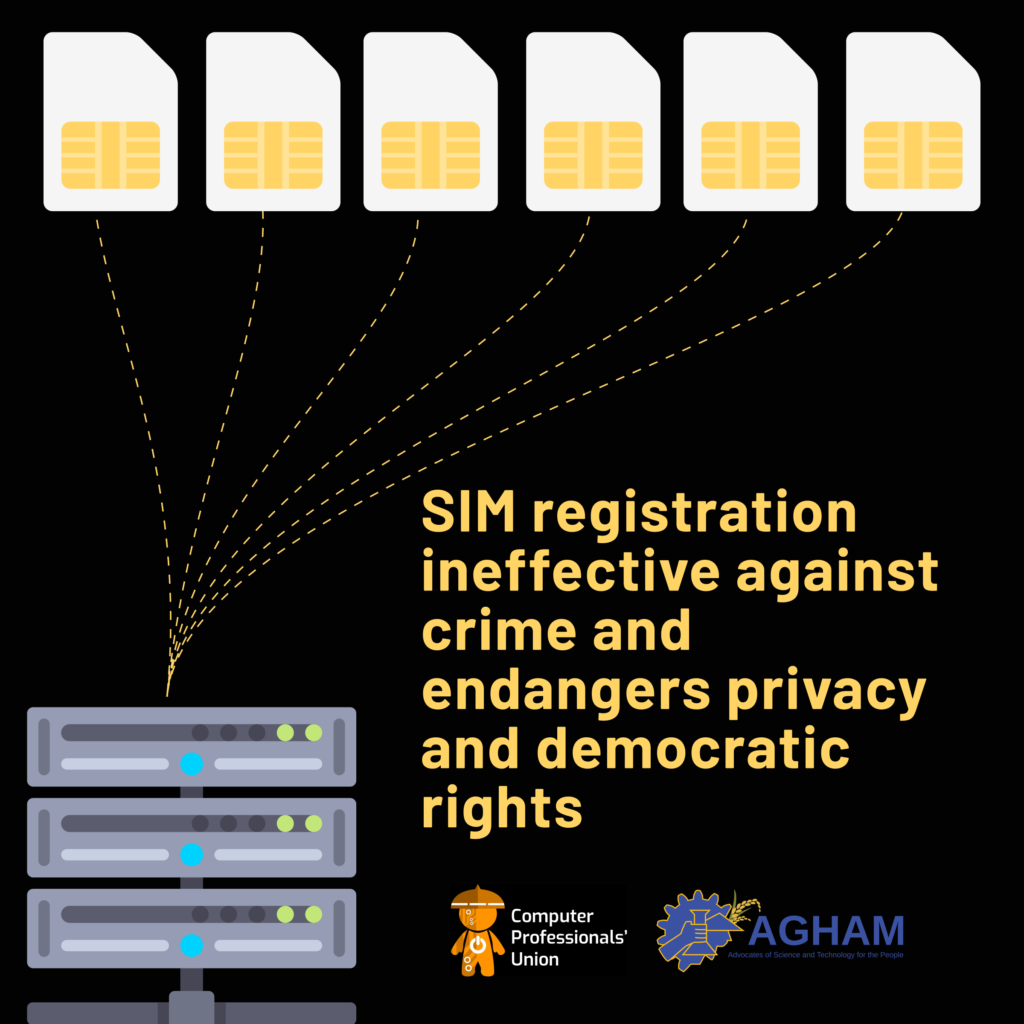
AGHAM – Advocates of Science and Technology for the People and the Computer Professionals’ Union express grave concerns over the railroading of the SIM Card Registration Act. The said bill envisions to deter cybercrime and internet trolls, however, its provisions offer no real solution to these problems and only limit our right to privacy and expose us to risk by consolidating personally identifiable information on a centralized server.
SIM Card Registration Policies have been proven ineffective and damaging by other countries who have adopted such measures. Privacy International reported that in Pakistan, SIM card registration has “resulted in the emergence of black markets for unregistered SIM cards, and a rise in identity fraud,” while in Mexico, their card registration law was repealed after “yielding no improvement in the prevention, investigation, and prosecution of associated crimes.”
The proposed SIM Card Registration Act also has no provisions in eradicating existing troll accounts. What’s more, requiring a real name and phone number in registering accounts will not prevent trolls from creating new accounts. If anything, it denies us the choice to separate our public personas from our private lives, or use a name which we identify with. This also opens up the possibility for the centralized database of the SIM Card Register to be made accessible to social media providers—mostly owned by foreign big tech companies such as Facebook, which is known to make processed user data available to third parties for profit.
Anonymity is also valuable to journalists, witnesses and whistleblowers, activists, human rights defenders, government critics, and victims of domestic abuse and violence against women and children. Requiring SIM card registration will make them more vulnerable to harassment and threats.
Under the penalties section of the bill, there is a clause that excludes law enforcement from being penalized for conducting spoofing activities. Given the record of the state’s human rights violations and attacks on freedom of expression perpetrated by law enforcement agencies, the SIM Card Registration Act, in tandem with the Anti-Terror Law, can be weaponized by the Philippine National Police (PNP) and the Armed Forces of the Philippines (AFP), both having long records of human rights violations.
Mandating SIM card registration information to be stored in a centralized database puts our data at risk. In recent years, we’ve seen how ineffective the state has been in protecting the people’s data and securing its own websites.
Many Filipinos, especially those who live in rural areas like the indigenous people, who have no identification documents would be disenfranchised, as well as those who simply choose to remain anonymous from the system. Prepaid SIM Cards are practical means to have a contact number, which are also often required to avail of services such as banking and finance, logistics, and even those provided by the government.
There is also the question of the feasibility of registering all active SIM Cards in the 6-month period stated in the bill. According to the Department of Information and Communications Technology, National Broadband Plan, there are about 75.4 million unique mobile users. Can telecommunications entities accommodate all their current subscribers in less than a year while we are nowhere close to resolving the COVID-19 crisis?
The SIM Card Registration Act will only bring harm and little to no benefits to the Filipino people. There are other effective ways to prevent crimes while ensuring the rights of our citizens. Better yet, focus on addressing the root causes of crime instead of writing policies that endanger the people’s safety and our right to privacy.
We thus strongly urge President Duterte to VETO this measure and bring back this monster to its grave.#
0 Comments